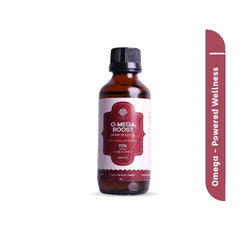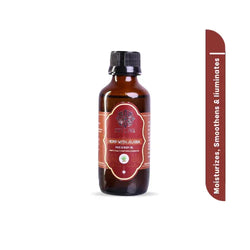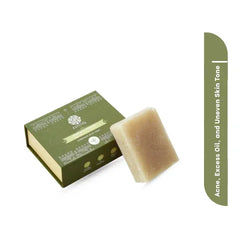It is a common myth that face oil will cause acne breakout and flare ups. The truth is that if the face oil you are using is natural, cold-pressed and non-comedogenic, it will boost hydration and treat acne-causing infections. Oils are easily absorbed by the skin and make it soft and supple from within. Right oil for your skin type will also help regulate sebum production, reduce blemishes and prevent future acne-breakouts.
What is a facial oil?
You definitely cannot apply your kitchen oil or a mustard oil on face. A face oil contains either one or a combination of plant or seed oils that can be used on the face or body.
Facial oils are meant to hydrate and nourish the skin to achieve rejuvenated and radiant skin. Face oil is not meant just for dry skin, as it helps retain right skin balance and restore skin suppleness in all skin types.
Facial oil is formulated especially for your face, so it won’t clog your pores. Contrary to general belief, they will help remove impurities from clogged pores and flush out toxins. This might initially trigger some acne initially. But over the period of time, your face skin will be deeply cleansed and pores tightened with a healthy appearance and natural glow.
What are Comedogenic ratings?
Non-comedogenic oil implies that it has a low potential to clog pores and the oil is suitable for all skin types. The comedogenic rating helps you know which oil will give you the desired result, especially if you have an oily skin. To be considered a non-comedogenic oil, oil rating should be less than 2 or equal.
Let's look at the ratings:
0 - Will Not Clog Pores
1 - low
2 - moderately low
3 - moderate
4 - fairly high
5 - high
Hemp seed oil and Moringa oil have 0 rating, making them one of the better choices.
How does a face oil work?
Application of face oil can help to achieve healthy and radiant skin for all skin types. Face oil is full of nutrients like vitamin C, essential fatty acids and antioxidants. When oil is applied, these nutrients penetrate the skin to build a resilient skin layer known as the lipid barrier. This layer protects the skin for all climatic issues. But you should know the correct way to apply them and to choose the right oil(s) for your skin type.
Basic Tips: How to Apply Face Oils
Here are some basic tips to help you get the most out of your face oils.
- When to apply oil?
Face oil should be applied based on your skin’s requirements. We recommend that it is best to use face oil overnight, after cleansing. Oils help clear clogged pores off impurities and toxins. However, when used during the day when the exposure to pollutants and dust is at the peak, it can work otherwise and choke clogged pores.
- Dab or pat oil into the skin
You should not rub the oil on your face like you apply moisturiser. Rather, it should be dabbed or patted on the skin, so that it enters the pores and not slide on skin surface. This ensures oil is penetrated inside the skin offering more benefits. If you notice some dry spots, oil can be applied to those spots as well.
- Use just a few drops
Face oils are super rich in terms of concentrated amounts of nutrients. It means little goes a long way. For your face, just 2-3 drops of oil is enough to spread over the face and deliver the benefits your skin needs.
How do you find the right oil for you?
The key to using face oils and achieving the required benefits comes from choosing the right oil or blend for your skin type. Here we have tried to do an elaborate study of what's recommended for different skin types-
- Aging Skin
With age, the skin produces less oil, and get dried more easily. This causes wrinkles for many. Facial oils can reduce your wrinkles because they contain antioxidants, preventing water loss and keeping the skin hydrated. Antioxidants boost collagen production resulting in skin elasticity and reducing fine lines.
Recommendation: Moringa and rosemary with tea tree oil. Try Satliva mango fresh face butter with rosemary oil.
- Dry/Dehydrated Skin
When you have dry skin that gets affected with change in weather, face oils can absorb quickly and moisturize deeply to smoothen your skin. For dehydrated skin, use a hydrating serum first, followed by a moisturizing oil to lock in all of the benefits of the serum.
Recommendation: Maracuja, argan, olive, sunflower, jojoba and coconut. Try Hemp with jojoba face and body oil by Satliva.
Oily/acne prone skin
Certain oils can help balance your skin’s oil production, get rid of excess oil and reduce the pores. Some oils can dissolve excess sebum and remove grime and fats from pores, thus minimizing the breakouts.
Recommendation: Macadamia, jojoba, tea tree, lavender and camellia flower oil.
Try Satliva Hemp with Moringa Face and Body Oil
- Sensitive/damaged Skin
Free radical–fighting antioxidants protect your skin against damage. Products containing primrose oil or those with a vitamin E base protect reduce the damage caused by sun and pollution. Its not a substitute of sunscreen. Face oils have anti-inflammatory properties so they can calm the skin and reduce rashes or any kind of skin irritation.
Recommendation: Primrose, Moringa, Jojoba
CONCLUSION
Facial oil are versatile oils, suitable for all skin types as it can protect skin from harmful pollutants. Face oil may be one of those things you haven’t tried yet, but surely try it before planning your skin regimen this time.
Our recommendation goes with cold-pressed, non-comedogenic and nutrient-dense natural Satliva oils.
Written by Namrata Kothari, Upword Media.




